Creating Meaningful Relationships
We’ve been giving you a look inside Nebraska’s NAESP PreK-3 Leadership Academy and introducing you to the Nebraska Advisors who are guiding the 20 members of cohort 2 through the academy. Read on to learn how Kim Flanders, Principal at McDonald Elementary, is leading her group through their capstone projects!
Kim’s group has chosen to focus their learning on the competency — Developing and Fostering Partnerships with Families and Communities. This competency spoke to her group, “Because families are our students’ first and most important teachers, our partnerships with families positively impact student achievement. When we are intentional with creating meaningful home-school relationships and opportunities for families to be collaboratively and actively engaged with their child’s learning, we foster the conditions necessary for students to be successful.”

Putting Knowledge Into Practice
Kim’s group has been able to apply all of the knowledge and skills they have gained during the leadership academy to their capstone projects, which were self-selected and based upon each educator’s interest. The culminating capstone project allowed them to integrate early childhood best practices and research by addressing a current problem of practice.
- Kerra Robinson
Assistant Director of Special Education Birth to 5 & Preschool Principal
Hastings Public Schools
Capstone Project: Fostering Partnerships with Families Through the Use of ReadyRosie®
Getting families involved in their child’s education is an important aspect of making sure students are successful. Through school-to-home partnerships, ReadyRosie® is an enrichment learning activity outside the school day that fosters family engagement. This researched-based parenting curriculum uses video playlists to promote school readiness. Because there were no programs in place to provide frequent and ongoing educational resources for families, Kerra’s project focused on creating a shared sense of purpose and partnership between teachers and families to create a meaningful home-learning environment. - Melissa Jantz
Preschool Principal
Little Panthers Preschool, Norfolk Public Schools
Capstone Project: Effective Transitions for All Kids
By strengthening the transition process for all students from early care and educational programs within the Norfolk community, Melissa’s goal is to increase the collaboration and mutual respect amongst all early childhood programs ensuring that all children are afforded a smooth and successful transition into kindergarten — regardless of which early care program or preschool they attend. A streamlined kindergarten enrollment process will support families at all of the elementary buildings within the community. - Sarah Sell
Assistant Principal
Crete Elementary
Capstone Project: Engaging Parents
In addition to supporting families during home visits and conferences, Sarah implemented ReadyRosie®. Teachers can build and share customized video playlists, communicate with families, and measure outcomes with this program. ReadyRosie® provides another way for teachers to collaborate and connect with families.
A Springboard to Success
We’ve been giving you a look inside Nebraska’s NAESP PreK-3 Leadership Academy and introducing you to the Nebraska Advisors guiding the 20 members of cohort 2 through the academy. Read on to learn how Amy Kroll, Director of School Improvement and Special Education at Weeping Water Public Schools, is leading her group through their capstone project.
Amy’s group has chosen to focus their learning on the competency of Developing and Fostering Partnerships with Families and Communities. This Competency focuses on establishing strong relationships with families and the community and recognizes that learning doesn’t just occur inside the school building. Creating partnerships with families and the community will create a culture of learning that spans all parts of a child’s life.
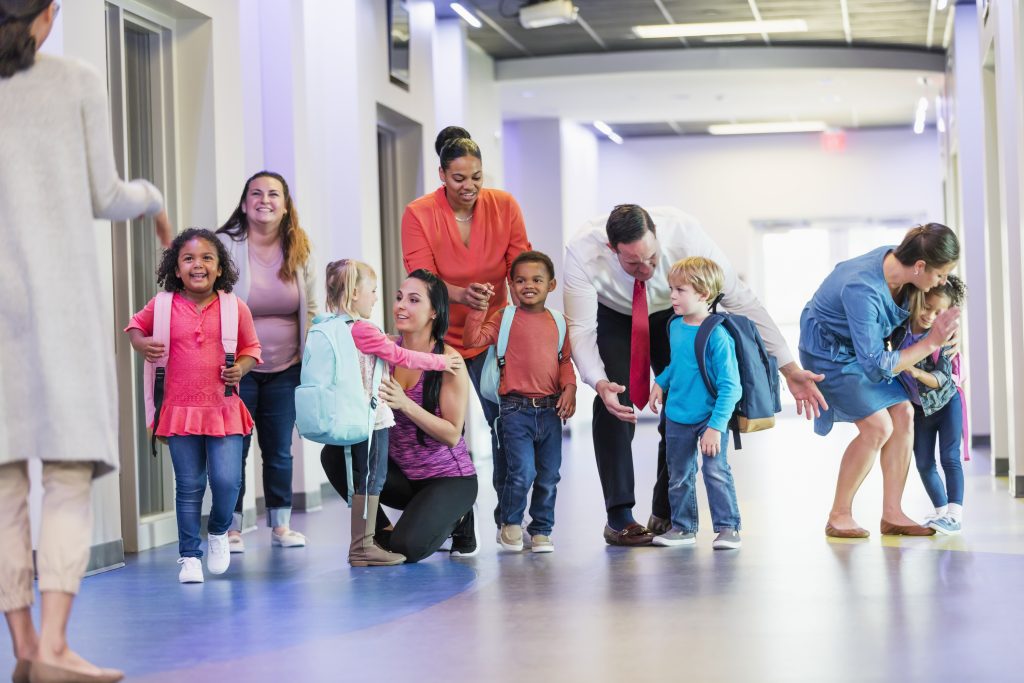
Amy has this to say about the members of her group, “My group is always looking for innovative ways to collaborate with those organizations, community members, etc. they see as vital in supporting a child’s development. They have excellent ideas already and each member contributes to the conversations. They have been able to find takeaways from their discussions and try it out in their own districts. This group is encouraging and supportive of each other while recognizing the challenges each of them face. They are true problem-solvers.”
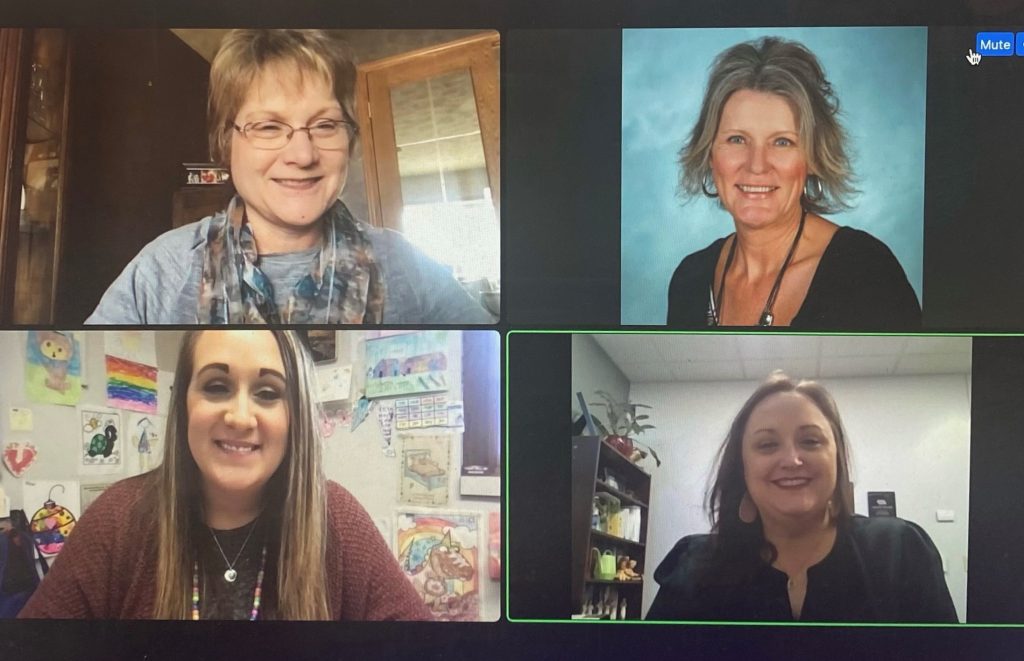
Pictured: Allyson Bohlen — Adams Central Early Learning Center, Abbey Cron — Centura Elementary School, Dr. Chelsea Feusner — Kearney Public Schools
The members of this group have gone after partnerships — whether it be with families or with community agencies and organizations. The premise behind their capstone projects is to have partnerships that will ease the transition from home to school. They have identified the gaps and barriers that may prohibit these partnerships and have done a great job addressing them.
Amy is very pleased with the path her cohort group is on, “I am very proud of the work they have done! Their capstone projects are helping them stay focused on their end goals — knowing full well that it cannot all be completed immediately — they will progress over time. They now have a springboard to launch and lead change in their districts.”
Ensuring Equitable Opportunities
We’ve been giving you a look inside Nebraska’s NAESP PreK-3 Leadership Academy and introducing you to the Nebraska Advisors guiding the 20 members of cohort 2 through the academy. Read on to learn how Jason Hippen, Director of Student Services for Nebraska Public Schools, is leading his group through their capstone project.
Jason’s group has chosen to focus their learning on the competency of Ensuring Equitable Opportunities. This competency consists of four major components.
Teachers and administration will:
- Develop critical self-awareness and knowledge of oppression, privilege and cultural competence.
- Establish a school climate that is open, inclusive and affirming of differences (for staff, students and their families).
- Examine school data sources and stakeholder feedback to identify disproportionalities and disparities.
- Differentiate resources and strategies to ensure students, teachers, staff and families have equitable opportunity to succeed.
In the early learning and the early grades, it is important to keep in mind that what a child currently knows and is able to do is largely reflective of the opportunities that child has been provided, not an indicator of what the child is capable of learning. As young children enter early care and education (ECE) programs and schools, the teachers and leaders they engage with profoundly influence the quality of learning opportunities they experience. It is during these PreK-3rd grade years that many young children encounter for the first time non-family members who influence how children think about their worth and who they are capable of becoming.
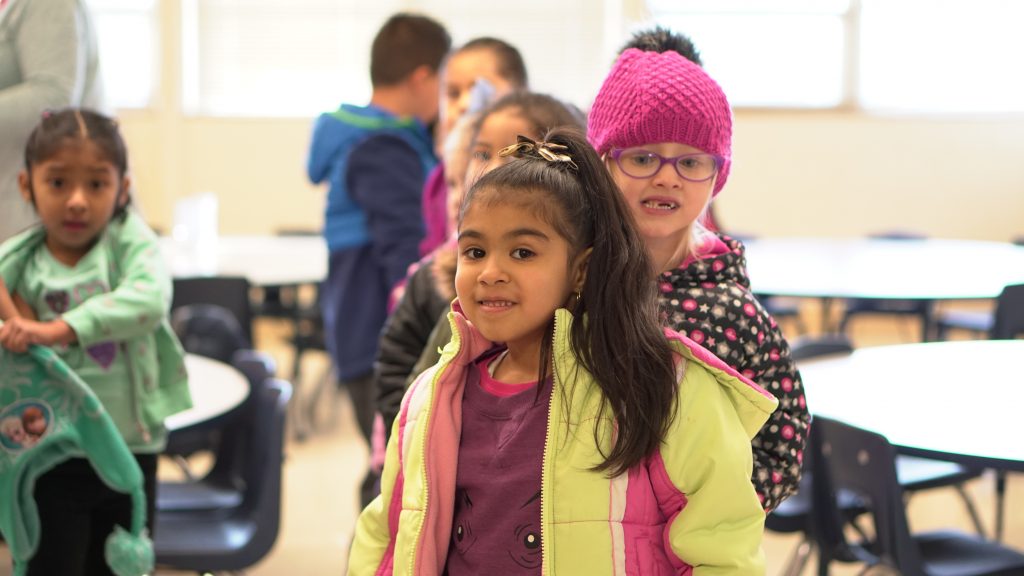
The four members of this group have created capstone projects to improve equitable outcomes for the students or families of their respective school districts. Each of these four capstone projects are described briefly below:
Family Engagement: A group member from Lexington Public Schools has increased the number of family engagement events and encouraged families to attend and realize the impact they can make on their child’s future. Family engagement, or getting parents involved their child’s education, is an important aspect of making sure students and families have equitable opportunities to succeed.
Equitable Learning Project: In Omaha Public Schools a teacher has created a sound wall within her classroom. Students add to this wall when they read words from stories that are specific to the skill area taught within that story. This project will help students become successful readers giving them equitable learning opportunities and resources.
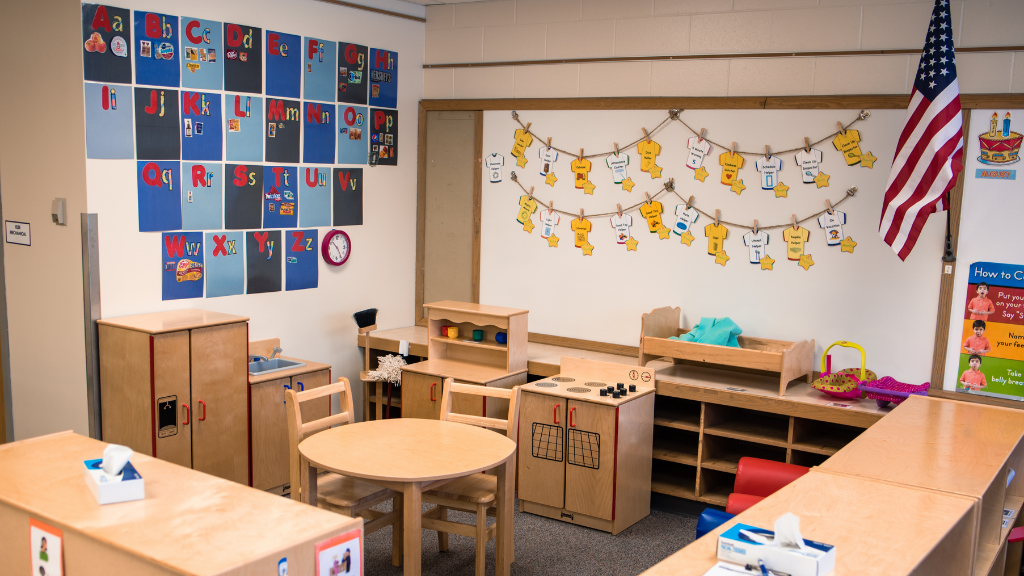
Preschool Placement for Students: A group member from Seward Public Schools has developed a system/rubric to tier students that are in preschool based on their level of need. This will help them be equitable in how students are placed in classrooms to better serve students and meet their specific needs.
Effective Preschool Strategies: Another team member from Omaha Public Schools is implementing specific engagement strategies so students can be more successful. These engagement strategies give every student an equitable opportunity to show improvement and demonstrate learning.
These capstone projects are expanding on the learning of each participant by demonstrating an action plan that relates to the competency of equity.
Embracing and Enacting
Welcome to Nebraska’s NAESP PreK-3 Leadership Academy blog! We will be bringing you updates and perspectives from the advisors who are leading the 20 members of cohort 2 through the leadership academy coursework. We checked in with advisor Tiffany Shonerd, Children Services Director at Blue Valley Community Action Partnership, to see how her group is coming on their capstone projects.
Within the Leadership Academy, participants spend time engaging with competencies that support their growth and development as a leader of a PreK-3rd grade space. After an initial overview of each of the competencies, cohort participants choose a competency that they would like to learn more about it. Provide a brief overview of the competency your group has chosen for their focus.
The great part of being an educator is having the love of learning. We want to learn for our growth, but also the development of others that we are teaching. My group is excited to have their capstone revolve around Competency 3: Embracing and Enacting a PreK-3rd Grade Vision in the Leading Learning Communities: A Principal’s Guide to Early Learning and the Early Grades book. This competency encourages a deeper look from school leaders on how to align vision, culture, and curriculum from within the early years and beyond. Each participant encapsulates their school or district vision and how they want to make it stronger for the individual learners.
How is your group learning in action through this process?
The assignments allow for more information through the resources given along with reflection and expert responses from the peers. For example, one participant advised on early learning workshops for the community’s early childhood workforce as a way to align the vision as a community. Another participant just started ReadyRosie, and a peer commented on how it has worked for her, so the comradery of the leaders is present and helpful with the project and just the job in general.
To demonstrate learning, cohort participants engage in a capstone project that directly relates to their competency and a problem of practice within their school/community. What capstone projects are the members of your group working on?
- Vertical alignment of math curriculum while using knowledge of child development as a guide to provide PD in this area for all teachers
- Alignment of the K-2 practices in English Language Arts to build a stronger primary system.
- The principal will engage in a once-a-month PK-3 PLC to help improve students and teacher outcomes in the areas such as SEL, DAP, behaviors, and other academics.
- Providing support to all teachers in understanding child development by using the child development continuum, looking specifically at the culture.
- Incorporating play based learning centers in the early learning classrooms to help decrease behaviors and increase student mastery of standards.
Describe how the capstone projects are expanding upon the learning from the course
Each individual participating in this course is taking different pieces of the learning opportunities that are embedded in this course and putting them to work. For instance, one participant has dove into curriculum alignment across a few lower grades in the PreK-3 grade classrooms. Her vision, along with the buy-in of her teachers, will create an understanding of each level of learning so there isn’t a repeat of learning in each grade and there isn’t an assumption on the next level teacher that something has been taught in the previous grade. This is specifically a reflective capstone assignment in lesson 4. Another participant dug deeper into how to incorporate STEM projects as a way to enhance her capstone project of play-based learning. The combination of the reflective questions and responses from the peers incorporates critical thinking along with support.
Bridging the Gap
Welcome to Nebraska’s NAESP PreK-3 Leadership Academy blog! We will be bringing you updates and perspectives from the advisors who are leading the 25 members of cohort 2 through the leadership academy coursework. This month we are featuring Andy DeFreece, Director of Elementary and Early Childhood Education at Millard Public Schools in Omaha.
Why did you want to be part of the Pre-K-3 Leadership Academy?
At Millard Public Schools we’ve worked really hard to align our early childhood and early elementary efforts. I work closely with principals and it has been my experience that they often feel very prepared to lead K-5 efforts but less confident in leading birth through preschool initiatives. Early childhood efforts are often complex because they originate from multiple funding sources, which can make learning how to articulate and focus our programs a challenge. This program was appealing to me because it provides new insights into all of these areas.
What communities are represented in your group?
In the past month which topic has caused the most discussion among the group?
In the past month we’ve been focusing on shared leadership and building the professional capacity of our teacher teams. Professional learning communities aren’t just for K-5 staff members. We can bridge the gap between Pre-K and K-3 and improve outcomes for children through aligned learning, a focus on effective instruction, and meaningful collaboration.
What big ideas resonated with the group most?
I would say the two big ideas which have resonated with our group the most have been understanding child development and its implications for high-quality instruction and the importance of developing and fostering partnerships with families and our communities.
What are you most looking forward to gaining through the Pre-K-3 Leadership Academy?
I find the new learning and networking with colleagues throughout the state to be the most rewarding part of the leadership academy. The content is really high quality and engaging — but listening to the reflections and great thinking of my peers brings it all together for me. I get new ideas each week and am always inspired by the members of my group.
Learning & Leading
Welcome to Nebraska’s NAESP PreK-3 Leadership Academy blog! We will be bringing you updates and perspectives from the advisors who are leading the 25 members of cohort 2 through the leadership academy coursework. This month we are featuring Kim Flanders, Principal at McDonald Elementary in North Platte.
Why did you want to be a part of the Leadership Academy?
Before becoming an elementary principal 10 years ago, I served as an elementary teacher in 3rd, 4th, and 5th grade and was also an instructional coach for North Platte Public Schools. We know that positive, high quality early childhood experiences provide the best opportunity to prepare children for success in school and life. With a strong focus upon the development of a child’s social, emotional, cognitive and physical needs — we have a moral imperative to ensure that the adults in their lives have the knowledge, understanding and fortitude to carry out this mission. As a previous cohort member, it’s an honor to not only continue to build my capacity around best early childhood practices, but also help my fellow colleagues along the way. Together we can improve early childhood programming in our school districts.
Which communities/school districts are represented in your group?
What big ideas resonated with the group most?
Some of the big ideas that have resonated the most during our discussions include: family engagement, transitions, play based learning experiences, and trauma-informed practices.
What are you most looking forward to gaining through the PreK-3 Leadership Academy?
I am looking forward to building my capacity in early childhood while learning and leading alongside members of my cohort.
Shaping The Future

Welcome to Nebraska’s NAESP PreK-3 Leadership Academy blog! We will be bringing you updates and perspectives from the advisors who are leading the 25 members of cohort 2 through the leadership academy coursework. This month we are featuring Jason Hippen, Director of Student Services for Nebraska City Public Schools.
Why did you want to be a part of the Leadership Academy?
I began my career as an elementary resource teacher for District 145 at Eagle Elementary School. I taught for nine years before earning my first administrative position as Principal/Student Services Director at Jefferson Elementary School in Fairbury. I served in that position for three years before taking on my current role. I will be entering my 10th year with Nebraska City Public Schools, and I want to pass on what I have learned to help someone else. I love being a part of a team and working together to come up with solutions. Through the academy, I can make connections with other educators — which will also help me in the future.
Which communities/school districts are represented in your group?
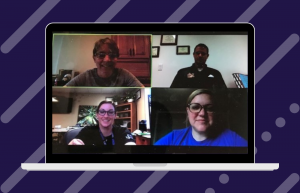
What big ideas resonated with the group most?
- The importance of early childhood education
- We have a great opportunity to work with young students and begin to shape their future
- Communication and connectivity makes a difference
What are you most looking forward to gaining through the leadership academy?
I hope to learn about new ideas, strategies and programs that can impact student success, as well as having the opportunity to collaborate with other Nebraska educators.
Embracing Early Childhood
Welcome to Nebraska’s NAESP PreK-3 Leadership Academy blog! We will be bringing you updates and perspectives from the advisors who are leading the 25 members of cohort 2 through the leadership academy coursework. This month we are featuring Amy Kroll, Director of School Improvement and Special Education at Weeping Water Public Schools.
Why did you want to be a part of the leadership academy?
I was asked by Melody Hobson to consider being an advisor for the first cohort — I jumped at the chance. I enjoyed it so much and was thrilled to be asked again. I didn’t have a background in early childhood when I accepted the position of special education director in Auburn 9 years ago. Part of that position was managing the early childhood/PreK programs. I learned everything on the job and was able to successfully expand PreK, start a Sixpence and Childcare Partnership Grant. I give credit to the fantastic early childhood staff I was blessed with. Since I am somewhat new to early childhood, I thought that my perspective was one that others could understand. You don’t need years of early childhood experience to lead successful programs — embracing early childhood can happen regardless of educational experience and background.
Which communities/school districts are represented in your group?
- Blue Valley Community Action
- Adams Central Early Learning Center
- Kearney Public Schools
- Educational Service Unit 1
- Valentine Community Schools
In the past month, what topic has caused the most discussion among the group?
How to engage colleagues (other administrators), teachers, families, and community members in supporting early childhood initiatives in their communities and emphasizing that play-based learning is learning.
What big ideas resonated with the group most?
Highly trained staff and strong administrative leadership is essential in the development of high-quality PreK-3 programs.
What are you most looking forward to gaining through the leadership academy?
I love learning from others and having conversations about real-life situations we are all facing. It’s fun to problem solve with a team! I also love reading about the latest research that supports our efforts in schools.


